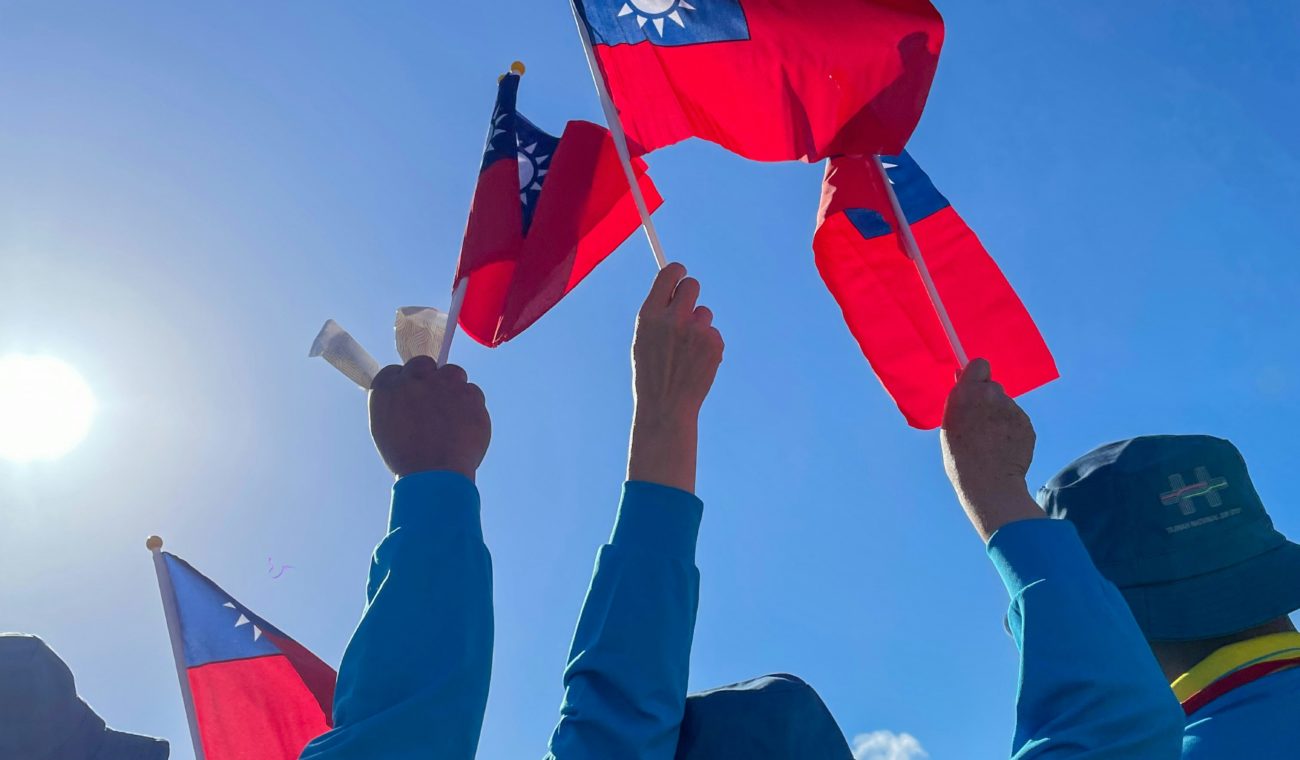Taiwan: Nationalists challenge Chinese Communists
Every Monday morning, you can listen the director of the Identity and Democracy Foundation on Ligne Droite, Radio Courtoisie’s morning show, followed by his column on our website. This week, we take a look at the Taiwanese nationalists’ victory in the January elections.
Watch the video:
Last January’s elections in Taiwan marked a new stage in tensions in the Pacific. Can you explain the context?
With the conflicts in Ukraine and the Middle East, we tend to forget that the Pacific is also an extremely important area of tension. This is because Taiwan is claimed by China. Indeed, a civil war ravaged China between 1927 and 1949, pitting the Republic of China led by the Chinese Nationalist Party (Kuomintang) against the rebels of the Chinese Communist Party (CCP). The latter eventually triumphed and established the People’s Republic of China, the regime that governs present-day China. The nationalists then fled mainland China for the island of Taiwan, then part of China. There, they have maintained a Republic of China, which they consider to be the only legitimate government of the whole China. For its part, the People’s Republic of China considers Taiwan to be part of its territory. So, we have one country (China) and two governments (the People’s Republic of China, which controls mainland China, and the Republic of China, which controls Taiwan). Internationally, these two entities are regarded as a single country, and the Communist government in Beijing is recognized by both the UN and the vast majority of the world’s countries, including the West. We are therefore faced with a paradoxical situation in which the West supports Taiwan… while recognizing Beijing’s sovereignty over the island. Taiwan therefore lives under the constant threat of annexation by Communist mainland China.
And recent years have seen these tensions increase, haven’t they?
Exactly. The war in Ukraine has led to a rise in tensions between China, which supports Russia, and Western countries, which support Ukraine and Taiwan. On the Western side, there is a fear that China is trying to do with Taiwan what Russia did with Ukraine. On May 23, 2022, Joe Biden stated that the United States was ready to defend Taiwan militarily in the event of a Chinese attack. Similarly, on August 2, Nancy Pelosi, Speaker of the US House of Representatives, visited Taiwan to express her support for the island. In response, China carried out massive military exercises around Taiwan and imposed economic and diplomatic sanctions. The Taiwan question is an important one for Europe, because in the event of a Chinese invasion of the island and Western support, Europeans would find themselves embroiled in the conflict as they were in the Ukrainian one. In such a case, the European Union would probably support the Taiwanese army financially and impose sanctions against China, which would have dramatic consequences for the European economy. Furthermore, Taiwan is the world’s leading producer of semi-conductors. The January 2024 elections therefore took place during this particularly tense backdrop.
And what are the political forces at work in Taiwan?
The political situation in Taiwan is dominated by the question of the relationship with China and, by extension, Taiwanese identity. On the one hand, the right-wing Chinese Nationalist Party (Kuomintang), which fled mainland China several decades ago and continues to advocate a Chinese nationalism that sees Taiwan as the only legitimate government in all of China. On the other is the left-wing Democratic Progressive Party (DPP), which advocates a break with this vision and defends a Taiwanese nationalism that sees Taiwan as a country distinct from China. It wants to proclaim a “Republic of Taiwan” and seek international recognition for the island. Both parties are pro-Western, although the Kuomintang’s Chinese nationalism makes it less hostile to China. Taiwanese political life is therefore dominated by the question: is Taiwan the real government of China, or a country in its own right? The 2024 elections once again saw these two visions of Taiwan clash.
And who won?
Lai Ching-te, candidate of the Democratic Progressive Party, won the presidential elections. This victory was doubly surprising. Firstly, because his party has already been in power for eight years, and most commentators expected the wear and tear of power to harm the Taiwanese nationalists. Secondly, because Lai Ching-te embodies the radical wing of the Democratic Progressive Party. Unlike the moderates led by former president Tsai Ing-wen, who are content with the current status quo, which they see as a form of de facto independence, Lai Ching-te and his supporters have not abandoned their dream of an internationally-recognized “Republic of Taiwan”. The Kuomintang, for its part, faced stiff competition from the Taiwanese People’s Party, a centrist party seeking to embody a third way between Chinese and Taiwanese nationalists, and from a populist candidate, the billionaire Terry Gou. Despite the latter’s withdrawal, the Kuomintang finally lost with 33.5% of the vote against 40% for the Democratic Progressive Party and 26.5% for the People’s Party. The Taiwanese nationalists, on the other hand, lost their majority in Parliament and will have to negotiate with the moderate Chinese nationalists of the People’s Party to govern.
And what are the consequences of this victory?
Above all, this victory is a challenge to China. While the Chinese Communists are multiplying declarations to the effect that Taiwan belongs to them and should be annexed (potentially for the People’s Republic of China’s centenary in 2049), the people of Taiwan have elected uncompromising Taiwanese nationalists who refuse to compromise with Beijing. Nevertheless, this new government faces a triple problem. Firstly, it depends on Western protection. In view of the debates surrounding aid to Ukraine and sanctions against Russia, it is questionable whether the people of the West, and in particular the people of Europe, will agree to support Taiwan if it requires them to make an even greater sacrifice. And if the will is there, the question arises of capacity. The United States is already carrying Ukraine and Israel at arm’s length. The multiplication of confrontation zones could put an end to American military capabilities. Secondly, the debates surrounding Taiwan’s identity and its relationship with China mask the structural problems facing Taiwan. Taiwanese political life neglects subjects that are just as important. The demographic question is particularly worrying. With 0.8 children per woman, Taiwan has one of the lowest fertility rates in the world, which threatens the country’s very existence in the long term. As the population ages, the Communists could end up annexing Taiwan without having to start a war. Finally, Taiwanese nationalism is very empty. Left-wing, civic-minded and very progressive, it struggles to really propose a strong national identity as an alternative to the Chinese nationalism of the Kuomintang and the Communist Party. Their vision for Taiwan seems uniquely negative, in reaction to Beijing, and all the more so as Taiwan is de facto vassalized by the United States. As a nation undergoing a major demographic crisis, struggling to define its identity and caught between two great empires, the USA and China, Taiwan’s problems are ultimately quite similar to those of Europe.






